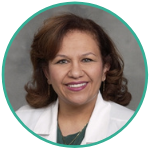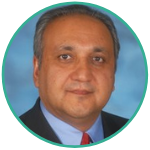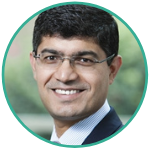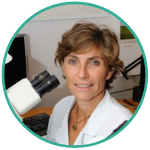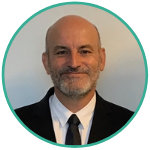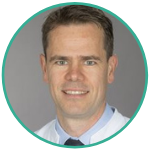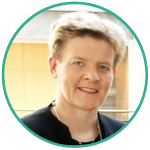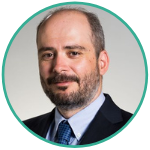Discover session chairs and speakers
Please find below some of the faculty of the EASL NAFLD Summit 2022. More chairs, speakers, and co-speakers will be added on a rolling basis.
For a full list, please refer to those listed on the scientific programme.
Discover her bio
Manal F. Abdelmalek, MD, MPH, FAASLD is a Professor of Medicine, Director of the Hepatobiliary Interest Group and Nonalcoholic Fatty Liver Disease (NAFLD) Clinical Research Program at Mayo Clinic, Rochester, Minnesota. Since first reporting on nonalcoholic steatohepatitis (NASH) as a cause of cryptogenic cirrhosis nearly 25 years ago, her clinical and research area of interest has focused on NAFLD / NASH, associated risk factors for disease acquisition and progression and the discovery of novel approaches to treatment. She has expertise in clinical-translational research, the design and conduct of clinical trials, including investigator-initiated, industry sponsored and NIH-funded clinical studies evaluating new therapies and biomarkers for NAFLD and NASH. She collaborates extensively to transition new compounds to first-in-man clinical studies and translate clinic-to-bench and bench-to-clinic research to define pathogenic mechanisms underlying NAFLD acquisition and progression. She is a key opinion leader in the field of NASH therapeutics, a member of the Liver Forum, and advisor/ consultant to many industries, FDA, and biomarker development companies in the area of diagnostics and therapeutics for NASH. She is the lead Principal Investigator on several multicenter global studies, a member of the AASLD Global Outreach and Engagement Committee and past member of the AASLD Clinical Research Committee. As a teacher and educator, she has mentored clinical residents, fellows, and faculty at rank of Assistant / Associate Professor in the study and research of liver disease. Dr. Abdelmalek is a Fellow of American College of Physicians, American College of Gastroenterology and American Association for the Study of Liver Disease. She is a steering committee member of the NIH Liver Cirrhosis Network and a former 16-year member NASH Clinical Research Network (NASH CRN. Dr. Abdelmalek has published more than 200 manuscripts and currently serves as an Associate Editor of HEPATOLOGY, the official journal of the AASLD.
Discover his bio
Frank Anania is currently the Acting Director of the Division of Hepatology and Nutrition at the US Food and Drug Administration (FDA). Frank joined the Agency in early 2018 following more than two decades of work as a physician-scientist in which he devoted his research to the study of mechanisms of hepatic fibrosis primarily to non-alcoholic steatohepatitis (NASH). As a clinical hepatologist Frank cared for patients with chronic liver diseases as well as pre- and post-liver transplant recipients. Prior to joining the FDA, Frank was the R Bruce Logue Chair of the Division of Digestive Diseases at Emory University in Atlanta. Frank’s recruitment to the FDA began the Agency’s successful development of its first ever Hepatology Division. In early 2023 the Division will have seven hepatologists. While the bulk of the Division’s portfolio is related to NASH, drug-induced liver injury (DILI) is also a major part of the Division’s workload. Since moving to Washington, Frank maintains an Adjunct Professor appointment at Georgetown University School of Medicine as well as a staff appointment in the Liver Diseases Branch of the National Institutes of Diabetes, Digestive, and Kidney Diseases (NIDDK) of the National Institutes of Health (NIH).
Discover his bio
Prof Quentin M. Anstee is Chair of Experimental Hepatology and Deputy-Dean of Research & Innovation in the Faculty of Medical Sciences, Newcastle University, UK. A practicing clinician, he is also an Honorary Consultant Hepatologist in the Liver Transplant Unit at Newcastle’s Freeman Hospital, where he leads one of the largest Non-Alcoholic Fatty Liver Disease (NAFLD) clinical services in the U.K. Prof Anstee’s translational research has made major contributions across the pathophysiology, natural history, diagnosis and treatment of NAFLD. His work has provided key insights into temporal changes in steatohepatitis during disease evolution, identified genetic and epigenetic modifiers of liver disease progression and hepatocellular carcinoma risk, and has substantially advanced the field of biomarker development in liver disease. He coordinates two major international research consortia that are studying NAFLD pathogenesis and developing/validating accurate biomarkers to assist the diagnosis, risk-stratification and monitoring of patients with NAFLD: ‘EPoS’ Elucidating Pathways of Steatohepatitis (EU H2020, 2015-2019) and ‘LITMUS’ Liver Investigation: Testing Marker Utility in Steatohepatitis (EU IMI2, 2017-2022). He has established the European NAFLD Registry and is the chief investigator of multiple ongoing clinical trials assessing new medical therapies for NAFLD. He is an Associate Editor of the Journal of Hepatology.
Discover her bio
Prof. Bugianesi MD, PhD, is an international acknowledged expert on Non-Alcoholic Fatty Liver Disease (NAFLD) with over 15-years experience in the field where she has made a particular impact with work describing the metabolic mechanisms of insulin resistance related to the onset and progression of liver damage, the natural history of the disease (including the first demonstration of HCC as a complication of NASH), the development of non-invasive markers of fibrosis, including the NAFLD Fibrosis score (currently recommended by the EASL-EASD-EASO Clinical practice Guidelines on NAFLD) and the involvement in several trials for the treatment of NAFLD/NASH. She has been national PI of major EU funded research consortia: Fatty Liver: Inhibition of Progression (FLIP) (2010-2013), ‘EPoS’ Elucidating Pathways of Steatohepatitis (2015-2019) and ‘LITMUS’ Liver Investigation: Testing Marker Utility in Steatohepatitis (IMI2, 2017-2022). As clinician, she is a practicing Hepatologist based at the GI Division of the University Hospital “Città della Salute e della Scienza of Torino”, Italy, where she is the lead physician for the Hepatology Outpatient Clinic and the Head of the Gastro-hepatology Laboratory. Her contribution to science is testified by over 200 publications, an H Index = 59, N. Citations = 19856 (Scopus).
Discover his bio
Laurent Castera (MD, PhD) is Professor of Hepatology at the University of Paris-VII (Department of Hepatology, Hôpital Beaujon, Clichy, France) and Visiting Professor of Medicine in University College of London (Institute of Liver and Digestive Health, Royal Free Hospital London, UK). He received his Medical degree from the University of Paris-VI and his PhD from the University of Paris-XII. His research interests focus on non-invasive methods for liver fibrosis assessment and NAFLD. He has published more than 200 papers in international peer reviewed journals and also serves on the editorial boards of the Journal of Hepatology, Gut and Liver International. He has been the chairman of the first international guidelines on the use of non-invasive tests (EASL-ALEH Clinical Practice Guidelines J Hepatol 2015). He has served on the Scientific Committee of the United European Gastroenterology (UEG) from 2011 to 2013 and is a member of the UEG Council since 2017. He has been a member of the European Association for the Study of the Liver (EASL) Governing Board from 2012 to 2013, EASL Vice Secretary from 2013 to 2015 and EASL Secretary General from 2015 to 2017.
Discover his bio
Prof John Dillon is Professor of Hepatology and Gastroenterology and a principle investigator, in the Division of Molecular and Clinical Medicine, School of Medicine, University of Dundee, based at Ninewells hospital, Dundee. He is also an Honorary Consultant with NHS Tayside, leading a busy general hepatology service and a research group. He graduated in medicine from St Georges Hospital Medical School, University of London, and subsequently gained his MD based on research performed in the University of Edinburgh while a lecturer in Gastroenterology and Hepatology. His research interests included; new pathways of care for patients with abnormal LFTs, for people infected with HCV, as well as novel diagnostics and treatments for NAFLD. His research activities stretch from the bench to the bedside and out into the community.
Discover her bio
Dr Sofia Forslund trained as a molecular biotechnologist in Uppsala, then in 2011 aquired a PhD in computational biology in Stockholm. After post-doctoral research at the EMBL she founded in 2018 the Host-Microbiome Systems Medicine of Cardiometabolic Disease group at the ECRC (joint MDC/Charité venture) in Berlin. Her work to date has focused in three main areas. 1) Evolutionary and systems bioinformatics tool development, confounder analysis and big data integration. Analysis of gene and genome evolution, including gene function prediction, is necessary to make the most of high-throughput “-omics” datasets. Furthermore, as the work of the lab has shown, human systems biology very strongly reflects patient demographics, risk factors and treatment effects, making it essential to account for confounding factors in bioinformatics analysis. The Forslund lab develops and benchmarks such “covariate-aware” analysis tools as well as tools for data integration. 2) Metagenome analyses of pathogenicity of microbiomes including antibiotic resistance. Bridging evolutionary bioinformatics to human-associated and environmental microbiome sequencing, the Forslund lab explores the evolutionary, ecosystem and clinical distributions of opportunistic pathogens, virulence capacity, and antibiotic resistance, and explores the role of external risk factors. Notable results include effects of antibiotic exposure at the population and individual levels, including reporting evidence of a role of antibiotics in food production driving resistance of bacteria in the human gut. 3) Roles of microbiota in rise, treatment, diagnosis and management of systemic disease or health of the host. The Forslund lab, in various collaborations, have linked the microbiome to type 2 diabetes, insulin resistance and hypertension, and are assessing the role of diet or medication in affecting this system with the goal of developing personalized medicine and nutrition platforms for complex diseases of the host. Twitter: @forslund_lab, @inanna_nalytica ; website: https://www.mdc-berlin.de/forslund
Discover his bio
Prof. Dr. Sven Francque obtained his MD at the University of Antwerp, Belgium, in 1994 and was subsequently trained in internal medicine and in gastroenterology and hepatology at the Antwerp University Hospital, Belgium and at the Department of Hepatology of the Beaujon hospital, Clichy, France. He has a long-standing interest and expertise in non-alcoholic fatty liver disease and conducted basic research focusing on the vascular changes in steatosis and their contribution to disease progression and leading to his PhD in 2011. His research unit continues to study pathophysiological mechanisms of NASH. He is also conducting clinical research and his unit is partner in several research consortia supported by the European Commission. He participates in several clinical trials in the field is as scientific committee member or PI involved in several phase 2 and 3 trials in NAFLD. He is senior clinical researcher for the Research Fund of the Flemish government. He is currently chairman of the Department of Gastroenterology and Hepatology of the University Hospital Antwerp and senior full professor of medicine at the Faculty of Medicine and Health Sciences of the University of Antwerp.
Discover his bio
Dr. Scott L. Friedman is the Dean for Therapeutic Discovery and Chief of the Division of Liver Diseases, at the Icahn School of Medicine at Mount Sinai. He has performed pioneering research into the underlying causes of scarring, or fibrosis associated with chronic liver disease, affecting millions worldwide. Dr. Friedman was among the first to isolate and characterize the hepatic stellate cell, the key cell type responsible for scar production in liver. His work has spawned an entire field that is now realizing its translational and therapeutic potential, with new anti-fibrotic therapies for liver disease reaching clinical trials. A 1979 graduate of the Icahn School of Medicine at Mount Sinai, he served as the President of Alpha Omega Alpha Honor Society, then was a Medical Resident at the Beth Israel Hospital, Harvard Medical School, Boston, followed by a Gastroenterology Fellowship at UCSF before assuming a faculty position there which he held for ten years. During a 1995-96 sabbatical from UCSF he was a Senior Fulbright Scholar and Visiting Professor at the Weizmann Institute of Science in Israel, in the laboratory of Professor Moshe Oren. Dr. Friedman has given invited honorary lectures throughout the world and has been a named lecturer or Visiting Professor at over 30 institutions worldwide. In 2003, Dr. Friedman was honored with the International Hans Popper Award by the Falk Foundation in Freiburg, Germany, in recognition of his outstanding contributions to the understanding of liver disease and its treatment. He has mentored over 85 postdoctoral fellows and students, most of who remain in academic training programs or faculty. In 2012 he was awarded the European Association for the Study of Liver Diseases International Recognition Award in Barcelona, Spain, and in 2013 he was awarded the Shanghai Magnolia Gold Award by the Mayor of Shanghai and the China Friendship Award from the Premier of China in 2014 in recognition of his efforts to improve the health of the residents of Shanghai and China through his research achievements. In 2016 he was awarded the Distinguished Achievement Awards from both the AASLD and the American Liver Foundation. He was elected as a Fellow of the American Gastroenterological Association in 2008, the Am. College of Physicians in 2013, the AASLD in 2014 and the American Association for the Advancement for Science in 2015. Dr. Friedman’s appointment in 2012 as Dean for Therapeutic Discovery at Mount Sinai recognizes his unique strengths in translating basic science into clinically meaningful advances, and his investigative work in liver disease has been instrumental in fueling the tremendous growth in emerging diagnostics and therapeutics for hepatic fibrosis. He is widely respected among commercial partners for his broad expertise from basic science to clinical trials, and currently consults for ~25 companies in the liver disease area.
Discover her bio
Dr. Amalia Gastaldelli is the research director of the Cardiometabolic Risk Laboratory at the Institute of Clinical Physiology (IFC) of CNR of Pisa, Italy, adjunct professor at the Division of Diabetes of University of Texas Health Science Center, in San Antonio, TX, USA (since 2006) and at the Scuola Superiore S. Anna in Pisa (since 2017). Her research includes the study of alterations in glucose and lipid metabolism, insulin resistance and ectopic fat accumulation. She has more than 25 years experience in leading national and international scientific projects investigating the pathophysiological mechanisms leading to metabolic diseases including obesity, non alcoholic fatty liver disease (NAFLD) and type 2 diabetes.
Discover his bio
Discover his bio
Dr Harrison earned his medical degree from the University of Mississippi School of Medicine. He completed his internal medicine residency and gastroenterology fellowship at Brooke Army Medical Center and a 4th year advanced liver disease fellowship at Saint Louis University. He is board certified in both Internal Medicine and Gastroenterology. Dr Harrison is a Visiting Professor of Hepatology at the Radcliffe Department of Medicine, University of Oxford. He is internationally known for studies in NAFLD/NASH with over 300 peer reviewed publications and an H Index of 88. Dr Harrison currently serves as the Medical Director for Pinnacle Clinical Research and the President of Summit Clinical Research in San Antonio, Texas.
Discover his bio
Zobair M Younossi, MD MPH FACG, FACP, AGAF, FAASLD Falls Church, USA Zobair M Younossi is the President of Inova Medicine as well as Professor and Chairman of the Department of Medicine at Inova Fairfax Medical Campus, Falls Church, Virginia, USA. Dr. Younossi earned his medical degree from the University of Rochester School of Medicine and Dentistry (Alpha Omega Alpha 1989) in Rochester, NY, USA. He then completed his residency in internal medicine with a fellowship in gastroenterology and hepatology at Scripps Clinic and Research Foundation in La Jolla, California, USA, while earning his master of public health degree with multiple honours from San Diego State University School of Public Health, San Diego, California, USA. He served as Staff Hepatologist and Senior Researcher at the Cleveland Clinic Foundation, Cleveland, Ohio, USA, before establishing the Canter for Liver Diseases at Inova Fairfax Hospital, which is now renowned for research related to outcomes research in liver disease and clinical, health services and translational research in non-alcoholic fatty liver disease (NAFLD). He has served as Vice President and Chairman of Research for Inova Health System. He also serves as the President and Chairman of the Board of Trustees of the Chronic Liver Disease Foundation (2018-Present) and the Board of Inova Health System Foundation (2011-Present). He was appointed by Governors T Kaine and B McDonnell of Virginia to the Board of Directors of Virginia Biotechnology Research Partnership Authority (2008-2014). He also served Virginia Tobacco & Health Research Repository (VTHRR), Board of Directors, America Heart Association, Mid-Atlantic Affiliate (2010-2012) and Board of the American College of Gastroenterology Institute for Clinical Research & Education (2013-2019). Finally, he has served on multiple committees for American Association for the Study of Liver Diseases, American College of Gastroenterology, American Gastrointestinal Association and George Mason University as well as numerous committees at Inova Fairfax Medical Campus and Inova Health System. Over the past 3 decades, Dr.Younossi has pioneered research in NAFLD and has been a leader in the field of patient-reported outcomes (PROs), economic assessment and outcomes research in liver disease. He leads several international efforts related to NAFLD and PROs in liver disease though global collaborations, including the Chair of Global NASH Council and the Global Liver and NASH Registries as well as Serving as the President and Chairman of the Board of Trustees of Chronic Liver Foundation. Dr. Younossi specializes in hepatology and gastroenterology, has authored over 600 articles, 3 books, 6 journal supplements, over 25 book chapters and over 1000 abstracts [resented at the international scientific meetings and has an H-index of 100. He is highly sought-after speaker and has provided over 470 faculty lectures in national and international meetings. Dr. Younossi has also served as the co-editor of Liver International, Associate Editor of J of Hepatology and on the editorial board of a number of important medical journals. He has represented the American Association of Liver Disease and American Gastroenterological Association at different congressional meetings.
Discover her bio
Yiannoula Koulla is the president of the Cyprus Liver Patients Association and a leader of the European Liver Patients’ Association – (ELPA)’s NAFLD/NASH group. She is also a member of the National Committee for Transplants, the National Cancer Committee, and the National Committee on TB, HIV, and viral hepatitis. Mrs Koulla got her diploma in Biochemistry and a few years later a diploma in Public Relations. She worked for many years for J&J pharmaceutical company as a product specialist in charge of central nervous system products (CNS). Her involvement with patients began when she became a patient herself and had been working for patients’ rights ever since. In the field of NAFLD/NASH, she co-authored many articles. One of the most quoted is ‘Redefining fatty liver disease: an international patient perspective’ published in The Lancet Gastroenterology & hepatology. Despite its increased recognition as a significant health threat, fatty liver disease associated with metabolic dysfunction remains largely underdiagnosed and undertreated. An international consensus panel has called for the disease to be renamed from non-alcoholic fatty liver disease (NAFLD) to metabolic-associated fatty liver disease (MAFLD) and has suggested how the disease should be diagnosed. This Viewpoint explored the call from the perspective of patient advocacy groups. Patients are aware of the negative consequences of the NAFLD acronym. This advocacy group enthusiastically endorsed the call to reframe the disease, which they believe will ultimately positively affect patient care and quality of life and, through this effect, will reduce the burden on healthcare systems. She also was the promotor of the ‘The Socrates survey’. This survey was done by ELPA, and the purpose was to uncover the unmet needs of people living with NAFLD/NASH to shape recommendations on how the diagnosis and management of the disease can be developed to improve patients’ quality of life. The following countries took part in this survey: Cyprus, Denmark, Egypt, France, Finland, Germany, Israel, Spain, and Slovenia.
Discover his bio
Prof Lazarus heads the health systems team at the Barcelona Institute for Global Health (ISGlobal), Hospital Clínic, University of Barcelona. He serves as Vice-Chair of the board of the EASL International Liver Foundation and is a member of the EASL Policy and Public Health Committee. He is also a steering committee member of the ACHIEVE European Hepatitis Elimination coalition and the Danish and Spanish viral hepatitis elimination coalitions. He is a PI on multiple viral hepatitis and NAFLD/NASH studies. He led the global NAFLD consensus statement and NAFLD models of care expert recommendation. He was part of the Lancet GastroHep Commission on Viral Hepatitis and led a working group on the EASL-Lancet European Liver Health Commission.
Discover his bio
Dr. Rohit Loomba is a Professor of Medicine (with tenure), Director of Hepatology, at University of California at San Diego. He is an internationally recognized thought leader in translational research and innovative clinical trial design in nonalcoholic steatohepatitis (NASH), and non-invasive assessment of NAFLD using advanced imaging modalities. Dr. Loomba is the founding director of the UCSD NAFLD Research Center where his team is conducting cutting edge research in all aspects of NAFLD including non-invasive biomarkers, genetics, epidemiology, clinical trial design, imaging end-points, and integrated OMICs using microbiome, metabolome and lipidome. This integrated approach has led to several innovative applications such as establishment of MRI-PDFF as a non-invasive biomarker of treatment response in early phase trials in NASH, which has now been adopted in more than 50 clinical trials conducted worldwide. He holds a patent on non-invasive biomarkers of NASH and fibrosis. His research is funded by the National Institutes of Health including two R01s, three U01 (two NIDDK and one from NIAAA), core director of P30 (NIDDK) and project director P01 (NHLBI) grant mechanisms, Foundation of NIH, National Science Foundation as well as several investigator initiated research projects funded by the industry. He is the Principal Investigator, UCSD, for the NIDDK-sponsored NASH Clinical Research Network. He served as the elected Chair of the NAFLD, Special Interest Group of the American Association for the Study of Liver Diseases (AASLD) and currently serves as the Chair of the Clinical Research Committee of the AASLD. He serves on the Editorial Board of Gastroenterology, Journal of Hepatology, GUT and Nature Reviews in Gastroenterology and Hepatology. He recently completed a 5-year term as the Deputy Editor of HEPATOLOGY, the official journal of the AASLD. Currently, he serves as the co-Editor of Alimentary Pharmacology and Therapeutics, an international journal in the field of gastroenterology and Hepatology. Dr. Loomba has published more than 350 manuscripts and has an H-index of 101. He is among the top 1% of the globally highly cited scientists across all fields in 2019, 2020 and 2021 by Web of Science. He is an elected member of American Society of Clinical Investigation.
Discover her bio
Sophie Lotersztajn, PhD, is Director of Research at the Institut National de la Santé et de la Recherche Médicale (INSERM). She is Deputy Director of the Center for Reasearch in Inflammation in Paris, and heads the group « inflammation and stress responses in chronic liver diseases », a fouding team of the laboratory of Excellence Inflamex. Her research focusses on the role of inflammation in chronic liver disease progression, with main interest on how macrophages and lymphocytes control liver fibrosis, injury and regeneration. She chaired and participated to several national and international evaluation committees (Fondation pour la Recherche Médicale, Inserm, EU etc..) and is a member of the american, european and french associations for the study of the liver. She has served as an Associate editor for American Journal of Physiology (2008-2018), for Journal of Hepatology (2015-2017) and as a co-Editor for Journal of Hepatology (2018-2019) . She is currently co-Editor of J Hep Reports
Discover her bio
Mojgan Masoodi is currently an Associate Professor in Lipid Metabolism and Molecular Nutrition at Faculty of Medicine and Director of Clinical Metabolomics research at University Hospital Bern. She is also an adjunct professor at Department of Nutritional Sciences, Faculty of Medicine, University of Toronto. She received her doctorate in pharmacology and targeted drug delivery in 2002 (Pharm D), and then completed her PhD in lipid metabolism and cell signalling in United Kingdom. In 2009, she joined the Medical Research Council (MRC) in Cambridge as an Investigator Scientist. She joined Nestle Institute of Health Sciences at EPFL campus in 2012. She was a group leader and led lipid metabolism group until 2019 before joining University hospital Bern. Her group is investigating lipid metabolism and the function of lipids in the regulation of physiological processes associated dyslipidemia. The aim of her group is to develop new and innovative approaches for patient stratification and nutritional intervention that could improve lipid metabolism and potentially prevent the onset of many common diseases associated with dyslipidemia and unresolved inflammation. Our lab uses combination of observational clinical studies that monitor metabolism during disease progress with in vivo/in vitro models that elucidate related mechanisms.
Discover his bio
Full Professor of Internal Medicine November 2005 to 2012 Full professor of Clinical Dietetics, July 2012 to present Head, Unit of Metabolic Diseases & Clinical Dietetics, S. Orsola-Malpighi University Hospital, Bologna, February 2007 – November 2019
Discover her bio
GELTRUDE MINGRONE, M.D. PhD Academic Appointments 2000-present Associate Professor of Internal Medicine, Department of Internal Medicine, Catholic University of Rome, Italy 2010-present Chief of the Division of Obesity and Related Disorders, Policlinico A. Gemelli, Rome, Italy 2018 Competition Qualified as full professor in Endocrinology in the national (Italian) competition September 2015-present Professor of Diabetes and Nutrition at the King’s College of London – Transcampus.
Discover her bio
Dr. J Bernadette Moore, Associate Professor of Obesity, University of Leeds. Dr. Moore earned her Ph.D. in Nutritional Sciences from the University of Florida and subsequently earned the prestigious Christine Mirzayan Science Policy fellowship to the National Academy of Sciences in Washington DC where her interests in science policy and childhood obesity were fostered. Prior to her recruitment to the University of Leeds in 2016, Dr. Moore was Senior Lecturer in Molecular Nutrition at the University of Surrey, where she had started her first laboratory in 2007. She is currently the Head of the Graduate School for the Faculty of Environment, which encompasses >500 postgraduate researchers. Research in Dr. Moore’s laboratory for the last ten years has been largely focused on the role of hepatic nutrient metabolism in healthy ageing, obesity and non-alcoholic fatty liver disease (NAFLD). To date, she has raised over 2.9 million pounds in research funding and been supported by the: BBSRC, EPSRC, Children’s Liver Disease Foundation, and the Universities of Surrey and Leeds. Her research employs a variety of genomic, proteomic, and systems biology tools alongside nutritional intervention studies. Current active strands include clinical and public health nutrition aspects related to dietary assessment and the prevention and management of NAFLD and obesity in children and adults. She has published >50 peer-reviewed papers, editorials and book chapters. Dr Moore was the recipient of the 2018 Nutrition Society Silver Medal for Research Excellence in a Young Investigator, and her recent work on the high sugar content of yogurts received significant international media interest, notably in the top 1% of >20 million Altmetric tracked publications.
Discover his bio
Director of the Centre for Liver Research & Professor of Experimental Hepatology, University of Birmingham, and Consultant Hepatologist at the Liver Unit, Queen Elizabeth Hospital, BirminghamHe graduated from the Medical School at the University of Edinburgh in 1995 and moved to Birmingham in 2007.He runs the metabolic services at the Liver Unit at the Queen Elizabeth Hospital Birmingham which includes a large multi-disciplinary clinic for patients with NAFLD. Professor Newsome has published over 75 research papers in scientific journals as well as many book chapters in the field of Non-Alcoholic Fatty Liver Disease (NAFLD). He was Chief Investigator on a randomised controlled trial of Glucagon-like peptide-1 (GLP-1) therapy in NAFLD published in the Lancet, and is also Chief Investigator on a study of Fibroscan in NAFLD. He is editor of a recently published textbook on Liver Transplantation, and chaired the national guidelines for liver transplantation in NAFLD. He sits on the NICE Guideline Development Group for NAFLD.
Discover his bio
Mazen Noureddin, MD, MHSc, was the founding director of the Fatty Liver Program at Cedars-Sinai Medical Center (currently ranked #2 in GI and GI surgery per US News). He recently relocated to Texas from California to establish a state-of-the-art Houston Research Institute. Dr. Noureddin did his internal medicine residency at the University of Southern California (USC) and then moved to the National Institutes of Health (NIH), where he enrolled in a three-year hepatology fellowship at the Liver Diseases Branch of the National Institute of Diabetes and Digestive and Kidney Diseases (NIDDK). There, he finished the NIH/Duke University Master of Health Sciences in Clinical Research program. After completing his NIH fellowship, he completed a gastroenterology fellowship at the University of California, San Diego (UCSD), where he was a T32 NIH fellow. He then joined the University of Southern California (USC) as an Assistant Professor of Clinical Medicine in 2013. He was then recruited to Cedars-Sinai Medical Center in 2015 to establish its new fatty liver program. Dr. Noureddin is internationally known for his research in the area of NAFLD/NASH and NASH related cirrhosis. He conducted more than 40 investigational clinical studies of novel treatments for NASH. He is an expert in non-invasive testing and biomarkers of NASH and cirrhosis. He has published in all these areas and has been invited to consensus panels on these topics by multiple international societies including the American Association for the Study of Liver Diseases (AASLD) and European Association for the Study of Liver Diseases (EASL). He has given invited lectures on NAFLD/NASH at national and international society meetings and serves on several steering committees/advisory boards for industry. He is the vice chair of the AASLD NASH special interest group (will be chairing the group in 2023) and serves on the editorial board for major GI journals including “Gastroenterology”, “Hepatology” and “Clinical Gastroenterology and Hepatology (CGH)”. He is one of the new Associate Editors of “Clinical Gastroenterology and Hepatology (CGH)”. He is funded by the National Cancer Institute and has served as a reviewer on NIH study sections. Dr. Noureddin has published in many journals including: The Lancet, Science Trinational Medicine, Journal of Hepatology, Journal of Clinical Investigation, Gastroenterology, Hepatology, Clinical Gastroenterology and Hepatology and others.
Discover her bio
Valérie Paradis, MD PhD and Professor in Pathology, is the chairman of Pathology department (Beaujon hopsital) and leader of the INSERM team “From inflammation to neoplasia in digestive diseases” (INSERM UMR 1149 Paris). Fields of interest and research include pathological and molecular aspects of liver fibrosis, vascular diseases, and tumorigenesis with a specific interest in tumor heterogeneity. To address this later issue, her team has developed original in situ proteomic approach (MALDI imaging) for identification of tissue signatures and biomarkers, and ex vivo culture model using thin tumor slices and organoids for evaluation of drug therapy. V. Paradis is chairing the specialty “Epithelium: interface structure” (Master 2 “Cellular Biology-Physiology-Pathology”). She is co-coordinator of the DHU UNITY “Unmet Needs for Innovation in HepaTology and GastroenterlogY” and task leader of the RHU QUID-NASH aiming to identify non-invasive diagnostic markers of NASH in diabetic patients. She is coordinating a collaborative FHU project MOSAIC aiming to identify imaging signatures through integration of radiological and histological features and Artificial intelligence. She is a member of International groups of liver pathologists (Laennec & Elves), Scientific commissions Research Institutes (INSERM, ANRS), Associate Editor (J Hepatol and WHO Classification of Digestive tumors 2019).
Discover his bio
Massimo Pinzani is currently Professor of Medicine, clinical hepatologist, Director of the UCL Institute for Liver and Digestive Health and the Sheila Sherlock Chair of Hepatology at University College London, United Kingdom. Most of his clinical and research activity is based at the Royal Free Hospital in London.Professor Pinzani has been Professor of Internal Medicine (2000-2010) and of Gastroenterology (2010-2012) at the University of Florence, in Italy. He received research and clinical training at the University of California Los Angeles (1984-1987) and at Case Western Reserve University in Cleveland, Ohio, USA (1988-1991). Professor Pinzani holds a PhD degree in Liver Pathophysiology. He has been awarded fellowships from the Royal College of Physicians (FRCP) and from the American Association for the Study of Liver Disease (FAASLD). He is currently adjunct Professor of Hepatology in the Division of Gastroenterology of Case Western Reserve University, Cleveland, Ohio, and Visiting Professor of Medicine in the Division of Hepatology Osaka City University Medical School, Osaka, Japan.
Discover her bio
Catherine Postic is a research group leader in the Department of Endocrinology and Metabolism at the Institut Cochin, INSERM U1016, CNRS UMR 8104 Université de Paris Cité. Catherine Postic earned her doctorate at the University Paris Diderot in Paris. She completed post-doctoral work at Vanderbilt University in Nashville, TN USA. During this post-doctoral fellowship she was trained in the field of molecular biology and achieved the making of a conditional locus for the glucokinase (gck) gene, a key gene of glucose metabolism. With his approach she has explored the cell-specific function of glucokinase in liver and pancreatic ß-cells and demonstrated the importance of this enzyme in the sensing of glucose. For the past 20 years she has been conducting research on the regulation of carbohydrate and fatty acid metabolism in liver under physiological and pathophysiological conditions (Type 2 diabetes; Non Alcoholic Fatty Liver Disease (NAFLD)). She has been an adviser for French government organization in the field of nutrition, metabolism, obesity and diabetes (INSERM) and a member of several national and international scientific committees for research on metabolic diseases. She is part of the Editorial Board of several scientific journals in the field of diabetes and metabolism including Diabetologia, Cell Reports, Journal of Clinical Investigation and Gut. Her work focused on the study of a sugar-activated protein, called ChREBP (Carbohydrate Responsive Element Binding Protein) whose expression is correlated with fatty liver in patients. Her team made discoveries in this field and her group published several comprehensive reviews on this topic, summarizing years of research on ChREBP (Abdul-Wahed et al. Cell Metab. 2017; Ortega-Prieto et al. Front Genet. 2019, Regnier et al. Nature Endocrinology 2022).
Discover his bio
Vlad Ratziu is a Professor of Hepatology at Sorbonne University, and performs his hospital work at the Pitié-Salpêtrière Hospital in Paris, France. Professor Ratziu received his medical training at Paris Descartes University; he then completed a 2-year postdoctoral fellowship at the Liver Center at the University of California, San Francisco, CA, USA, and went on to earn a doctoral degree from Paris Diderot University for his work on the pathophysiology of viral and metabolic liver fibrosis.
Discover her bio
Helen Reeves graduated from Nottingham Medical school in 1990, moving shortly afterwards to Newcastle-upon-Tyne under the mentorship of Professor Oliver James. She completed a PhD studying cell signaling pathways in liver fibrosis and then worked as a post-doctoral scientist with Professor Scott Friedman at Mount Sinai Medical School in New York, funded by an AASLD Fellowship, studying aspects of the molecular pathogenesis of cancers. Presently she is Professor of Liver Cancer at Newcastle University and is the clinical lead for the care of patients with hepatocellular carcinoma in Northern England. She has been a scientific committee member for the British Association for Cancer Research, and served as the UK representative on the governing board for the European Association for Study of the Liver from 2013 until 2016. She currently serves on the EASL Education Committee. She is a founding member for HCC-UK and remains an active committee member. Her particular research focus is on non-alcoholic fatty liver disease related HCC and the identification of improved stratification biomarkers and targeted therapies. She has a programme grant from Cancer Research UK and leads the CRUK, AECC, AIRC jointly funded HUNTER: Hepatocellular Carcinoma Expediter Network.
Discover his bio
Consultant Hepatologist, Clinical Lead for Hepatology, Hepatology Unit, Beaumont Hospital, Dublin, and Associate Professor RCSI University of Medicine and Health Sciences, Dublin Ireland
Discover his bio
Professor Dr. Michael Roden is Chair and Full Professor of Internal Medicine, Endocrinology and Metabolic Diseases at Heinrich-Heine University, Director of the Department of Endocrinology and Diabetology at University Hospital Düsseldorf and Chief Scientific Executive Officer of the German Diabetes Center (DDZ) since 2008. Since 2017, he is Speaker of the Committee Medicine of the German Council of Science and Humanities, which advises the President and Federal Government of Germany (Wissenschaftsrat). He is further a Speaker of the German Centers for Diabetes Research (DZD). Professor Roden was head of the 1. Medical Department of the Teaching Hospital of Medical University of Vienna, Hanusch Hospital, Max-Kade Fellow at Yale University, USA, and Associate Professor at University of Vienna, Austria. He was President of the Central European and Austrian Diabetes Associations, Honorary Treasurer of EASD and currently serves as Chairman of EFSD. He contributed paradigm-shifting concepts to insulin resistance and energy metabolism in diabetes and non-alcoholic fatty liver disease. These activities resulted in >600 peer-reviewed publications in journals such as Nature, Lancet D&E, Cell Metabolism and Journal of Clinical Investigation, with >10 0000 citations, giving him a h-factor of 75. He currently serves on editorial boards of e.g. Molecular Metabolism and American Journal of Physiology.
Discover his bio
Stefano Romeo is Professor in Molecular and Clinical Medicine at the Institute of Medicine at the University of Gothenburg, Sweden and Senior Consultant in Endocrinology and Metabolic Diseases at the Sahlgrenska University Hospital. He is adjunct Professor at University Magna Graecia of Catanzaro in Italy. Dr Romeo’s research focus is the role of genetic variants in metabolic disorders such as fatty liver disease (FLD) and dyslipidemia. His research field ranges from genetic association studies in large cohorts to molecular genetics and characterization of human mutations. Dr Romeo identified genetic risk and protective determinants in the PNPLA3, MBOAT7, GPAM, APOE and PSD3 genes.
Discover his bio
Prof. Dr. Manuel Romero-Gómez (Seville, 1967) Specialist in Digestive Diseases. Chief of Liver and GI Section in Virgen del Rocío University Hospital. Full Professor of Medicine at Medical School, University of Seville. Head of SeLiver Group at Institute of Biomedicine of Seville (IBIS), Ciberehd group 47/2006 and CTS-532 research group in Andalucia. Director of Hepatic, Digestive and Inflammatory Diseases Program at IBIS. External expert in Scientific Committee at IRyCIS, FPS, ISCIII, European Commission and NIH/NIDDK. Subproject leader and National Leader on European projects FLIP and LITMUS. Vicepresident AEEH. Coordinator of Personalised Medicine working group in Covid-19 in Andalucia, Spain.
Discover his bio
Arun J. Sanyal, M.D Virginia Commonwealth University 1200 East Broad Street P.O. Box 980341 Richmond, Virginia 23298-0341, United States (804) 828-4060 arun.sanyal@vcuhealth.org Arun J. Sanyal, M.D., is a Professor of Medicine, Physiology and Molecular Pathology and Interim Chair in the Division of Gastroenterology at Virginia Commonwealth University (VCU) Medical Center in Richmond, Virginia. Dr. Sanyal also serves as Chairman of the NIH NASH Clinical Research Network, the NIMBLE consortium and the Liver Forum for NASH and fibrosis. His research interests include all aspects of NAFLD and NASH as well as complications of end stage liver disease. He has served as a member of numerous advisory boards to pharmaceutical companies and also the liver center at Yale University. He chaired the hepatobiliary pathophysiology study section of the NIH and was a founding member of the Hepatology committee of the American Board of Internal Medicine. He has also served as Secretary as well as President of the American Association for Study of Liver Diseases. Dr. Sanyal has authored more than 350 articles in such publications as Cell Metabolism, Nature Medicine, New England Journal of Medicine, Lancet, Gastroenterology, Hepatology, and the Journal of Infectious Diseases and has a H-index of 102. He has been continuously funded by the NIH since 1995 and is the principal investigator of four active NIH grants. He is the recipient of the Distinguished Mentorship Award from the American Gastroenterological Association and the Distinguished Scientific Achievement Award from the American Liver Foundation in 2017 and the Distinguished Achievement Award from the AASLD in 2018.
Discover his bio
Elmer Schabel, MD, is working as clinical assessor at the Bundesinstitut für Arzneimittel und Medizinprodukte (BfArM), the drug regulatory authority in Germany. After several years of clinical education he joined BfArM in 1997, where he is responsible for all pre- and post-licensing regulatory activity regarding chemically defined medicinal products in the field of gastroenterology and hepatology.He became subsequently involved into the European network of regulators centered at the European Medicines Agency (EMA) in London. Since 2005 he has been working with the Scientific Advice Working Party (SAWP), of which he became a full Member in 2008. The SAWP is responsible for advising companies on their pre- and post-licensing drug development plans. In 2010 he was also appointed a member of the Gastroenterology Drafting Group at the EMA, which is in charge of the preparation of Scientific Guidelines in the field of gastroenterology and hepatology, and of which he has been serving as Chairman during the years 2011-2018. Elmer Schabel has also been involved in the activities of the Liver Forum, a multi-stakeholder organisation for the facilitation of drug development in the field of NAFLD/NASH, has served as a member its Steering Committee until 2019.
Discover his bio
Jörn M. Schattenberg, M.D. is a Professor of Medicine and Director of the Metabolic Liver Research Program at the University Medical Center Mainz, Germany. He received his medical degree in 2002 after studying at the University of Mainz (Germany) and at the Tulane University in New Orleans (US). He completed his postdoctoral training at the Albert-Einstein College of Medicine, New York, where he focused on delineating signaling pathways involved in the pathophysiology of acute and chronic liver injury with a special focus on metabolic liver disease and non-alcoholic steatohepatitis (NASH). He is board-certified in Internal Medicine and Gastroenterology & Hepatology and Infectious Disease. He built up the Metabolic Liver Research Program that focuses on translational sciences and clinical trials and leads a translational liver research laboratory. Prof. Schattenberg is a member of the Scientific Committee of UEG, and a member of the Editorial Board of Hepatology and the Alimentary Pharmacology & Therapeutics.
Discover his bio
Dr. Robert Schwabe is a Professor in the Department of Medicine and in the Institute of Human Nutrition at Columbia University, and the Director of the Columbia University Digestive and Liver Disease Research Center. Dr. Schwabe received his MD as well as a doctoral degree in Immunology from Ludwig-Maximilians-University in Munich, Germany. His laboratory is dedicated to studying consequences of liver injury including inflammation, fibrosis and cancer and is currently employ novel bioinformatic tools to understand key drivers of fibrosis and liver cancer in the context of non-alcoholic steatoheaptitis (NASH). Dr. Schwabe’s lab has shown key roles of the hepatic stellate cells in liver fibrosis development and liver cancer promotion as well as role of Toll-like receptors and the gut microbiota in liver fibrosis and liver cancer development. Dr. Schwabe has authored >140 publications, including senior author papers in Nature Medicine, Cancer Cell, Cell Metabolism and the Journal of Clinical Investigation. Dr. Schwabe hold several grants from the NIDDK/NIH and NCI/NIH, and is a past recipient of grants from the American Liver Foundation, a Research Scholar Award from the American Gastroenterological Association and postdoctoral fellowships from the American Liver Foundation and the German Academic Exchange Service. Dr. Schwabe is currently an Editor for Journal of Hepatology Reports, a past Associate Editor of Gastroenterology, and Journal of Hepatology, and a former member of the Hepatobiliary Pathophysiology study section of the NIH.
Discover his bio
Detlef Schuppan is Gastroenterologist and Hepatologist, Professor of Medicine and Director of the Institute of Translational Immunology and the Center for Celiac, Small Intestinal and Autoimmune Diseases at Mainz University, Germany. He is also Professor of Medicine at BIDMC, Harvard Medical School, Boston. He is cofounder, Co-CEO, CSO and CMO of ImmuneNTech. His translational research focuses on liver inflammation, fibrosis, celiac disease, type 2 food allergies/IBS, the gut-liver axis, the role of nutritional factors and the intestinal microbiome in autoimmunity, and GI and liver cancer. This includes preclinical/clinical validation of novel therapies, including siRNA and nanoparticles, and the development of noninvasive biomarkers to predict and monitor disease activity. DS has been and continues to be consultant, principal and co-Investigator in numerous clinical phase 1-3 trials in celiac disease, liver fibrosis, NASH, metabolic and autoimmune diseases.
Discover her bio
Dr. Hannele Yki-Järvinen, MD, FRCP, is Professor of Medicine at the Department of Medicine, University of Helsinki, Finland. She is a specialist in internal medicine and endocrinology. Her main academic interests are causes and consequences of insulin resistance in vivo in humans, especially non-alcoholic fatty liver disease (NAFLD), and application of this knowledge to treatment of type 2 diabetes. She has published over 200 original articles in English and over 50 reviews and written chapters to textbooks such as the International Textbook of Diabetes Mellitus, the Oxford Textbook of Endocrinology and Diabetes and the Textbook of Diabetes. She has received several international awards including the G. B. Morgagni Young Investigator Award, Padova, Italy, the 28th Minkowski Award, European Association for the Study of Diabetes, Istanbul, Turkey, the Anders Jahre Pris, University of Oslo, Oslo, Norway and Novartis Award in Diabetes for excellence in patient-oriented research in San Diego, USA. 2008. She has given many award lectures such as the 16th Servier Lecture in Manila, Philippines, the first Dr. Augusto D. Litonjua Endowed Lectureship, Manila, Philippines. In 2011, she gave received the Harold Rifkin Visiting Professorship at Albert Einstein College of Medicine, New York, USA. She is currently funded by 3 grants from the European Union for study of NAFLD.
Discover his bio
Frank Tacke, MD, PhD, MBHA, Head Dept. of Hepatology & Gastroenterology at the Charité – Universitaetsmedizin Berlin, Germany He was educated at the medical school in Hannover, Germany, and has received training at the University of Texas (1998-1999: New gene therapy strategies), and as a post-doctoral research training at the Mount Sinai Medical Centre, NY, (2004-2006: Monocyte/macrophage and dendritic cell biology). 2006-2019 he has been a clinical physician and research laboratory leader at the University Hospital Aachen, Germany. He is board-certified in Internal Medicine, Gastroenterology, Endocrinology and Diabetology, Critical Care Medicine and Infectious Diseases. He has (co)authored >500 peer-reviewed original and review articles, and he is listed as a “Highly Cited Researcher 2020” in the area “cross-field”. He has served on the Governing Board of the EASL (2014-2018) and is currently Co-Editor at the J Hepatol. Professor Tacke has been appointed in 2019 as the Head of Hepatology and Gastroenterology at the Charité – Universitätsmedizin Berlin, one of Europe’s largest university hospitals and renowned for excellence in medicine. 1. Lefere S, Puengel T, Hundertmark J, Penners C, Frank AK, Guillot A, de Muynck K, Heymann F, Adarbes V, Defrêne E, Estivalet C, Geerts A, Devisscher L, Wettstein G, Tacke F. Differential effects of selective- and pan-PPAR agonists on experimental steatohepatitis and hepatic macrophages. J Hepatol. 2020; 73(4):757-770. 2. Krenkel O, Hundertmark J, Abdallah AT, Kohlhepp M, Puengel T, Roth T, Branco DPP, Mossanen JC, Luedde T, Trautwein C, Costa IG, Tacke F. Myeloid cells in liver and bone marrow acquire a functionally distinct inflammatory phenotype during obesity-related steatohepatitis. Gut. 2020; 69(3):551-563 3. Krenkel O, Tacke F. Liver macrophages in tissue homeostasis and disease. Nat Rev Immunol. 2017; 17(5):306-321.
Discover her bio
DINA G. TINIAKOS MD, PhD, FRCPath Dina Tiniakos is Professor of Pathology and Director, Dept of Pathology, Aretaieion Hospital, National & Kapodistrian University of Athens, Greece, and an academic hepatopathologist at the Translational and Clinical Research Institute, Faculty of Medical Sciences, Newcastle University, UK. Her main research interests are fatty and autoimmune liver disease and hepatocarcinogenesis.Dina is co-leading several European consortia on liver pathology, is central pathologist for major international clinical trials on nonalcoholic steatohepatitis, and has served as external assessor for several European research grant awarding bodies and academic departments of pathology. She has authored/co-authored more than 180 peer-reviewed scientific articles and chapters in textbooks of liver pathology. She is Associate Editor of “Histopathology” and Editorial Board member of “Journal of Hepatology” and “Annals of Gastroenterology”. Dina is Council Member, United European Gastroenterology serving as Chair, Equality & Diversity Taskforce (2020-2023) and was President, European Society of Pathology (2017-2019). She is an invited member of the International Liver Study Group “Gnomes” and the Laennec Liver Pathology Society. Contact details: Prof Dina G. Tiniakos Translational & Clinical Research Institute, Faculty of Medical Sciences, Newcastle University, Framlington Place,Newcastle upon Tyne NE2 4HH, UK dina.tiniakos@newcastle.ac.uk Dept of Pathology,Aretaieion Hospital,National & Kapodistrian University of Athens, 76, Vas. Sofias Avenue,Athens 11526, Greece dtiniak@med.uoa.gr
Discover his bio
Michael Trauner, MD, received his medical education at the Karl-Franzens-University in Graz, Austria, where he started his residency and fellowship in internal medicine in 1991. From 1994 to 1997 he was trained as an Erwin Schrödinger postdoctoral research fellow of the Austrian Science Foundation at Yale University’s Department of Internal Medicine and Liver Center in New Haven, USA, where he worked on the molecular alterations of hepatobiliary transport systems in cholestasis. After returning to Graz, he completed his training in internal medicine and a fellowship in gastroenterology and hepatology. He then established an internationally recognized research group in cholestatic and fatty liver diseases, and founded the Liver Center at the Medical University of Graz, serving as professor of experimental and clinical hepatology. Since 2010 he has been professor of gastroenterology and hepatology and chair of the Division of Gastroenterology and Hepatology at the Medical University of Vienna, where he is also division head of one of the largest clinical gastroenterology, endoscopy, and liver services in Europe. Dr. Trauner’s main research interests are the molecular mechanisms of bile acid transport and signaling in cholestatic and fatty liver diseases, the mechanisms of cell injury in cholestatic and fatty liver disease, and the development of novel pharmacologic treatments for cholestatic and fatty liver diseases. He has published more than 580 peer-reviewed scientific papers listed in Pubmed (H-index 88), 45 book chapters and has edited 3 books. He has delivered more than 250 invited lectures at international scientific meetings, mainly on molecular and clinical aspects of cholestatic and metabolic liver diseases, and holds three patents on the treatment of cholestatic and metabolic liver diseases. Dr. Trauner is past president of the Austrian Society of Gastroenterology and Hepatology, a member of the German National Academy of Sciences Leopoldina, Academia Europaea, member of the Austrian Academy of Sciences, member of the Academia Europaea, a fellow of the American Gastroenterological Association (AGAF) and American Association for the Study of Liver Diseases (FAASLD), as well as a member of several other national and international professional and scientific societies. He has served on editorial boards and scientific committees, such as the European Association for the Study of the Liver (EASL) Governing Board and the United European Gastroenterology Council. He has also served as associate editor of Journal of Hepatology (2000 – 2009, and since 2020) and Hepatology (since 2009-2021).
Discover his bio
Professor Emmanuel Tsochatzis (MD, MSc, FEBTM, FRCP, PhD) is a Professor of Hepatology and Consultant Hepatologist at the UCL Institute for Liver and Digestive Health, Royal Free Hospital in London. He is Head of the Centre for Metabolic Liver Disease in ILDH and a member of the EASL Scientific Committee and Governing Board. His main research interests include non-alcoholic fatty liver disease, cirrhosis and portal hypertension and non-invasive assessment of liver fibrosis. He is the recipient of the Rising Star in Gastroenterology prize by the UEG and the EASL Physician Scientist Fellowship. His work on the cost-effectiveness of non-invasive fibrosis tests has informed the World Health Organization (WHO) guidelines on diagnosis and treatment of both HBV and HCV. He has designed and implemented a primary care pathway for NAFLD referrals to secondary care. He leads the specialist multidisciplinary service in NAFLD at the Royal Free Hospital and has an active research program in NAFLD. He has published more than 230 articles in peer-reviewed journals. He has received funding for his research from NIHR, EASL and EU Horizon 2020.
Discover his bio
Luca Valenti graduated in Medicine in 2000, and Specialized in Internal Medicine in 2005 at the University of Milan. He was then fellow at the Diabetes Research Center at Columbia University, NY and the Department of Internal Medicine, University of Milan, where is now Associate Professor of Internal Medicine. He coordinates clinical and translational research at the Metabolic Liver Diseases Center at the Fondazione IRCCS Ca’ Granda Policlinico Hospital in Milan. His main research interests are metabolic and genetic liver diseases, with a special focus on non-alcoholic fatty liver disease and iron metabolism disorders.
Discover her bio
Prof. Dr. Luisa Vonghia obtained her MD in 2005 and subsequently was trained in Internal Medicine in 2010 at the Catholic University of Rome, Italy. She was fellow at the Hepatology and Gastroenterology department at the University of Antwerp, Belgium, with special focus on non-alcoholic fatty liver disease (NAFLD), leading to a Joint PhD between the University of Bari, Italy and the University of Antwerp, Belgium, in 2014. She is currently Associate Professor at the Faculty of Medicine and Health Sciences of the University of Antwerp. She participates in several clinical trials in NAFLD and she is involved in different research consortia supported by the European Commission. Her research is mainly focused on the pathophysiological mechanisms of NAFLD, particularly on the metabolic and immunological disorders associated to NAFLD.
Discover her bio
Prof. Shira Zelber-Sagi. Department Gastroenterology, Tel-Aviv Medical Center, Tel-Aviv. Dean, School of Public Health, Faculty of Social Welfare and Health Sciences, University of Haifa, Haifa, Israel Prof. Zelber-Sagi is a clinical dietitian, Epidemiologist and a researcher in nutritional epidemiology. Graduated BSc in nutrition sciences at the Hebrew University. Graduated a PhD in Epidemiology and Preventive Medicine at the Sackler School of Medicine at Tel Aviv University. Is an Associate Professor and Head of the School of Public Health, Faculty of Social Welfare and Health Sciences, University of Haifa. She is a member at the “National Committee for Nutrition, Gastroenterology and Liver Disease”. She is also a member at the EASL Policy and Public Health Committee and the United European Gastroenterology (UEG) Policy and Public Health Committee. She is the founder of the Gastroenterology and Hepatology dietitians’ forum, the Israeli Dietitians Association. Her research deals mainly with nutrition and non-alcoholic fatty liver disease (NAFLD) epidemiology, prevention and treatment. Email: zelbersagi@bezeqint.net


